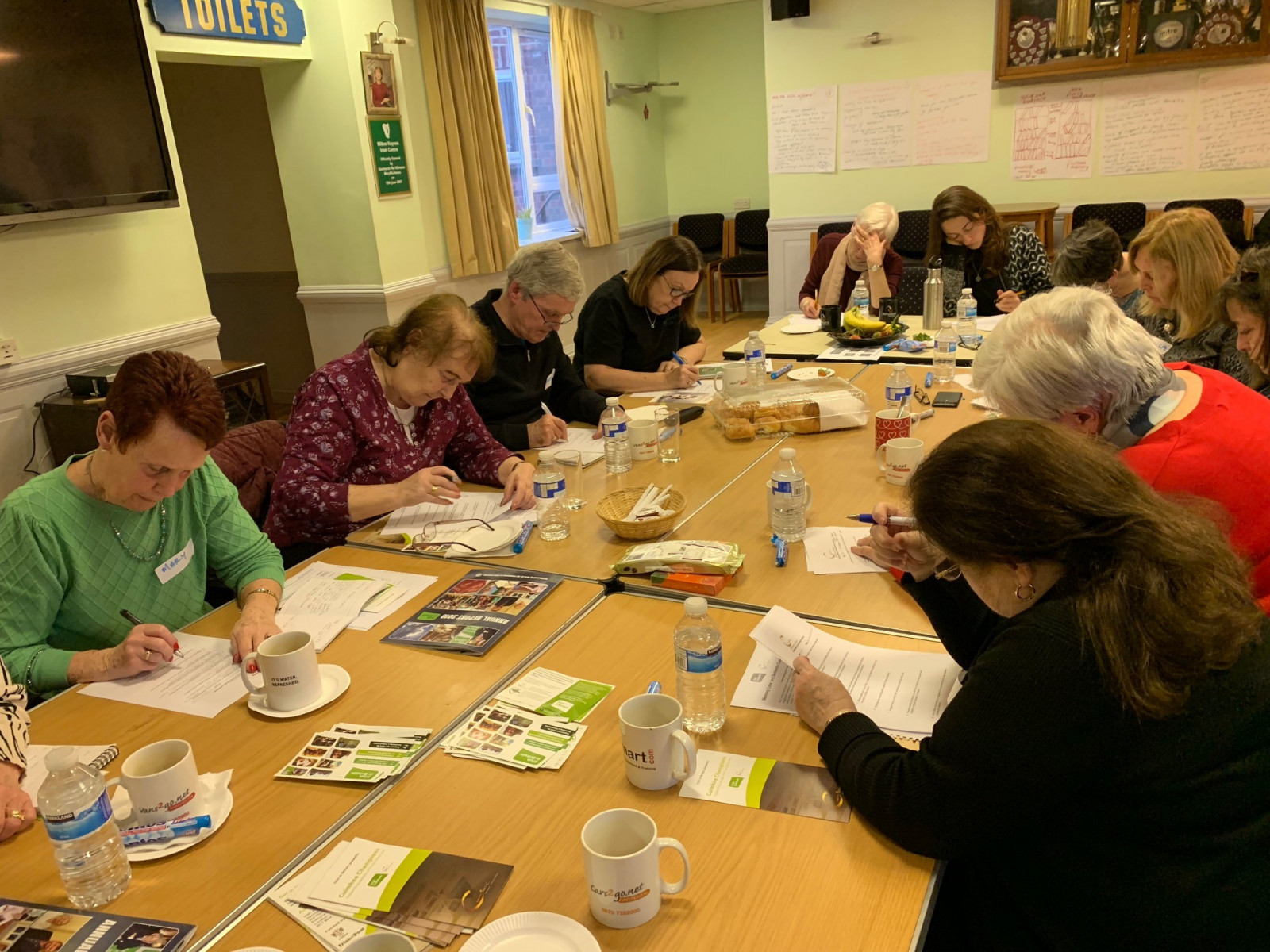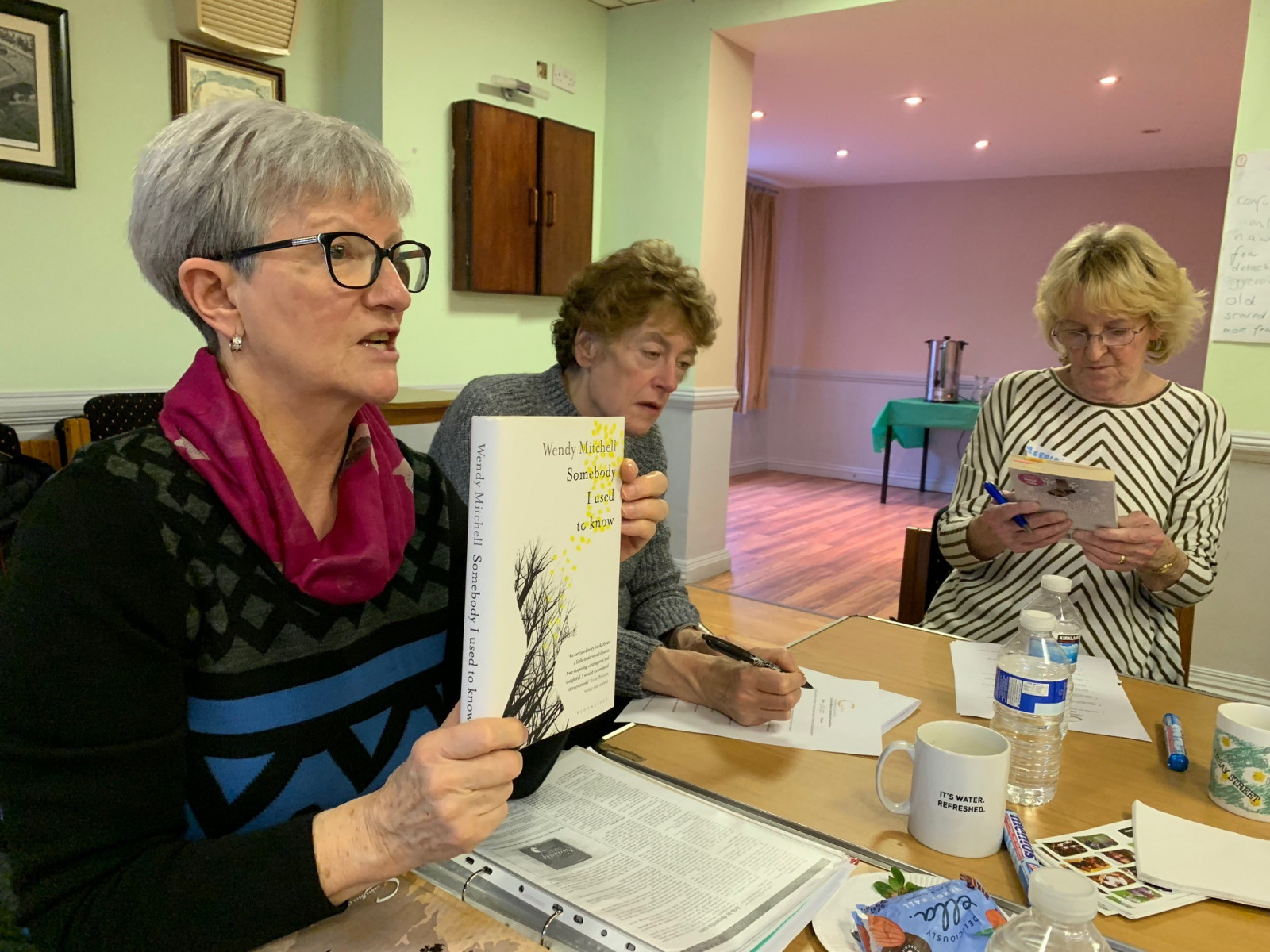A visit to Milton Keynes for Cuimhne workshop
Back to all
Many thanks to Cuimhne Champion Anne Jervis for volunteering support with learning and discussion at our Cuimhne workshop on Understanding Memory Loss and Dementia in Milton Keynes Irish Centre this month.
A big thank you too to Mary Charlwood and Jo Shally for bringing together participants and to all participants for sharing experiences and ideas and all the great discussion.

Group working
Anne Jervis writes:
On Tuesday 22 January 2020, a cold damp foggy morning, I drove up the M1 from Watford to the Milton Keynes Irish Centre in Fenny Stratford. My purpose was to support the Cuimhne training – facilitated by Mary Tilki and Zibby Loakthar. Cuimhne means memory in the Irish language. I was given a warm welcome by members of the Milton Keynes Irish Welfare Support Group, and that all important cup of tea. Northampton Irish Support Group were also there for the training. In total there were 18 of us.
A large meeting room was provided for the training session. Lots of supplies of fruit, snacks and hot drinks were available to keep us all energised. We started with introductions. Everyone in the group had some connection in dealing with dementia; be it family, friends or work. It was clear at this stage that there would be a lot of different experiences that the group could share and thus learn from one another.
Mary started off by explaining what dementia is; in short, a disease of the brain and on a positive note, that 90 percent of people will not develop the disease. The group acknowledged that we are all forgetful at times and the importance of knowing when that line crosses to being dementia. First impressions were shared of how the general public often perceived dementia. ‘Doting’ was a term used to refer to older Irish people suffering from memory loss.
Discussion followed around the unique cultural needs of the Irish community and how their cultural needs differed from other communities in the United Kingdom. An example given was “put the messages in the press” which means “put the shopping in the cupboard”. In general, the Irish are very proud and often do not want to acknowledge that they need help.
Many of the group shared their own personal experiences of people they knew with dementia and the realisation that something was changing in that person. Early signs are often around communication. If Irish was their first language, a person with dementia may sometimes revert back to speaking Irish. The group shared many stories which sparked lots of conversations.
Focus on carers was highlighted as this is a group often forgotten; there are 850,000 people living with dementia and 700,000 carers. Carers are often above retirement age and may be in poor health themselves. Care homes were discussed. Many Irish families feel that there is a stigma attached to putting a family member with dementia in a home; they should look after their own. The reality is often that a decision to move an individual to a nursing home is because there has been a crisis and that the carer can no longer look after that person.
Mary stressed the importance of getting a diagnosis as soon as possible. Once a diagnosis has been given then a support network can be organised.
We stopped for a hot lunch at 12.30. It was good to be able to circulate amongst the group. I was delighted to meet a lady who had gone to the same secondary school.
In the afternoon session the group discussed various case studies of how people showing signs of dementia could be supported. The group had a chance to look at the Irish In Britain resource “My Story” and Cuimhne Champion Richard Lucas’ “My Life Through Song”.

Mary showing book cover
The group were also introduced to two books that can help open community conversations about dementia: Martin Slevin’s The Little Girl in The Radiator and Wendy Mitchell’s “Somebody I used to know”. At the end of the day everyone shared ideas for future actions.
The feedback from the training session was very positive, all finding it very interesting.
Comments included:
“It has given me a greater insight into the illness”
“I feel I now understand dementia much better and will be able to have much better interactions with those who have dementia”
“workshop exercises like drawing the 50p from memory can certainly increase empathy”
“Speak to a person direct and listen to them”
“Just thank you – an informative and interesting day!”
Everyone felt that they had a greater understanding of dementia and would apply this learning. The group also learnt a lot from each other by sharing how they had dealt with challenging situations.
Thank you, Milton Keynes Irish Welfare Support Group, Northampton Irish Support Group and Milton Keynes Irish Centre Ltd for an interesting and positive training session.